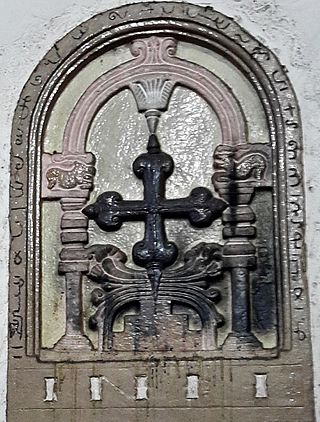
The Saint Thomas Christians, also called Syrian Christians of India, Marthoma Suriyani Nasrani, Malankara Nasrani, or Nasrani Mappila, are an ethno-religious community of Indian Christians in the state of Kerala, who, for the most part, employ the Eastern and Western liturgical rites of Syriac Christianity. They trace their origins to the evangelistic activity of Thomas the Apostle in the 1st century. The Saint Thomas Christians had been historically a part of the hierarchy of the Church of the East but are now divided into several different Eastern Catholic, Oriental Orthodox, Protestant, and independent bodies, each with their own liturgies and traditions. They are Malayalis and their mother tongue is Malayalam, which is a Dravidian language. Nasrani or Nazarene is a Syriac term for Christians, who were among the first converts to Christianity in the Near East.

The Syro-Malabar Church, also known as the Syro-Malabar Catholic Church, is an Eastern Catholic Church based in Kerala, India. It is a sui iuris (autonomous) particular church in full communion with the Holy See and the worldwide Catholic Church, with self-governance under the Code of Canons of the Eastern Churches (CCEO). The major archbishop presides over the entire church. The incumbent Major Archbishop is Raphael Thattil, serving since January 2024. The Syro-Malabar Synod of Bishops canonically convoked and presided over by the major archbishop constitutes the supreme authority of the church. The Major Archiepiscopal Curia of the church is based in Kakkanad, Kochi. Syro-Malabar is a prefix reflecting the church's use of the East Syriac Rite liturgy and origins in Malabar. The name has been in usage in official Vatican documents since the nineteenth century.

The Church of South India (CSI) is a united Protestant Church in India. It is the result of union of a number of Protestant denominations in South India that occurred after the independence of India.

The Malankara Mar Thoma Syrian Church, often shortened to Mar Thoma Church, and known also as the Reformed Syrian Church and the Mar Thoma Syrian Church of Malabar, is an autonomous Oriental Protestant Christian church based in Kerala, India. While continuing many of the Syriac high church practices, the church is Protestant in its theology and doctrines. It employs a reformed variant of the West Syriac Rite Divine Liturgy of Saint James, translated to Malayalam.

The Malankara Metropolitan or the Metropolitan of Malabar is an ecclesiastical title given to the head of the Malankara Syrian Church. It evolved from the title of the sixteenth century East Syriac metropolitans of India who were also styled the Metropolitan of Malabar. Since the division among the Saint Thomas Christians following the Synod of Diamper, the title has been mostly employed in association with the West Syriac branch of the community, usually known as the Malankara Church, among whom the office of the Malankara Metropolitan became the continuation of the local dynastic Archdeaconate. Currently there are two presiding Malankara Metropolitans in India. One is of the Malankara Jacobite Syrian Orthodox Church under the Universal Syrian Orthodox Church of Antioch and the other one is of the Malankara Orthodox Syrian Church in India.

Believers Eastern Church is a church of Indian origin with congregations and parishes worldwide. It follows an episcopal governance and structure. It holds Christ as its head and further requires that bishops and ordained ministers submit to its metropolitan and his successors. It is governed by a committee of bishops, the synod, with one central bishop holding the honorary title of "first among equals" and follows Evangelical Christian doctrine. BEC is administratively based in the state of Kerala in southwestern India. The church has 57 dioceses in 14 nations. Its membership consists of more than 3.5 million in 10 countries speaking a hundred languages. It has 30 bishops, and the Metropolitan Bishop was Moran Mor Athanasius Yohan I Metropolitan.
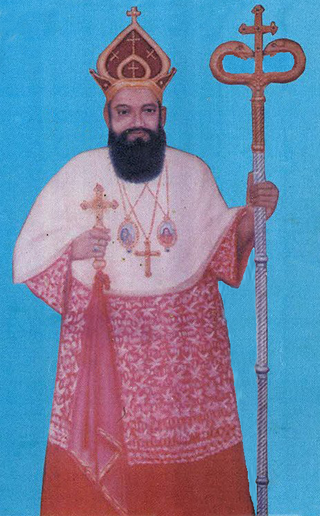
Mar Dionysius III, also known as Punnathra Mar Dionysius and born Kurien was 11th Malankara Metropolitan and Successor to the Holy Apostolic Throne of St.Thomas from 1817 until his death. Dionysius had a long career in the Malankara Church prior to his consecration as Metropolitan. It was his suggestion during the time of Mar Thoma IX to establish the Syrian seminary at Kottayam, Kerala's first educational institution. He also welcomed some of the first missionary teachers who arrived from England to teach in the seminary. In 1816, following the demise of Mar Dionysius II, who had not appointed a successor, Kurien was elected to succeed him as the Malankara Metropolitan by the general assembly of the Church and was ordained as bishop by Geevarghese Mar Philexenos II of the Malabar Independent Syrian Church.

The Malankara Church, also known as Puthenkur, is the historic unified body of West Syriac Saint Thomas Christian denominations which claim ultimate origins from the missions of Thomas the Apostle. This community, under the leadership of Thoma I, opposed the Padroado Jesuits as well as the Propaganda Carmelites of the Latin Church, following the historical Coonan Cross Oath of 1653. The Malankara Church's divisions and branchings have resulted in present-day Churches that include the Jacobite Syrian Christian Church, the Malankara Orthodox Syrian Church, the Malankara Mar Thoma Syrian Church, the Malabar Independent Syrian Church, the Syro-Malankara Catholic Church, the Saint Thomas Anglicans of the Church of South India and the St. Thomas Evangelical Church of India.

St. Mary's Orthodox Syrian Church, Kottayam, commonly known as Kottayam Cheriapally, is a Malankara Orthodox Syrian Church located in Kottayam, Kerala, India. Cheriapally meaning ‘small church’, whose appearance contradicts its name, is one of the oldest and well-preserved churches in the state. Cheriapally is located on the way to Kumarakom from Kottayam. The church is dedicated to mother Mary. Kottayam Cheriapally, built in 1579, has retained its old world charm today as well even after so much of environmental changes. The length and breadth of the church is constructed with innovative paintings, mural, and architecture. Before the inception of the Old Seminary in 1815, Kottayam Cheriapally was the Headquarters of the Church and Malankara Metropolitans for a long time.
South Kerala Diocese is a diocese of the Church of South India which consists of CSI churches in Trivandrum and Kollam districts of Kerala. It is one of the biggest dioceses in the Church of South India. In April 2015, a part of the diocese was removed to form a new diocese, the Kollam-Kottarakkara Diocese. In Kerala, there were, until April 2015, three other CSI Dioceses viz: North Kerala Diocese, Madhya Kerala Diocese, East Kerala Diocese. In 2010, the diocese had 352 ordained pastors, 49 retired pastors and more than 200 church workers. There are 70 districts and 623 churches in this diocese.
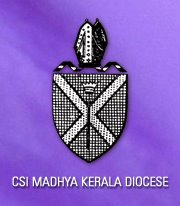
The Madhya Kerala Diocese is one of the twenty-four dioceses of the Church of South India covering the central part of Kerala. When the Church of South India was formed on 27 September 1947, the diocese was called the Diocese of Central Travancore. It was a part of the erstwhile Anglican Diocese of Travancore and Cochin founded in 1879. The Diocese was later renamed as the Diocese of Madhya Kerala.
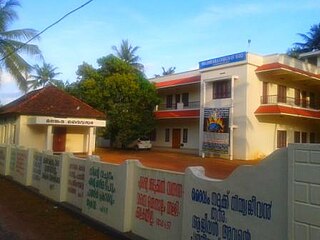
Malankara Church of God Thrikkannamangal is a church in Kottarakkara, Kerala, India, originally known as Malankara Poorna Suvisesha Sabha.

The Saint Thomas Christian denominations are Christian denominations from Kerala, India, which traditionally trace their ultimate origins to the evangelistic activity of Thomas the Apostle in the 1st century. They are also known as "Nasranis" as well. The Syriac term "Nasrani" is still used by St. Thomas Christians in Kerala. It is part of the Eastern Christianity institution.
Cherakarottu Korula Jacob was Bishop of Travancore and Cochin in the mid twentieth century (1945-1957). He was the 6th bishop of the diocese and the first native bishop and the first bishop of the Madhya Kerala Diocese of the Church of South India.

The East Kerala Diocese is one of the twenty-four dioceses of the Church of South India covering the eastern part of Kerala.The diocese headquarters is at Melukavu, Kottayam.
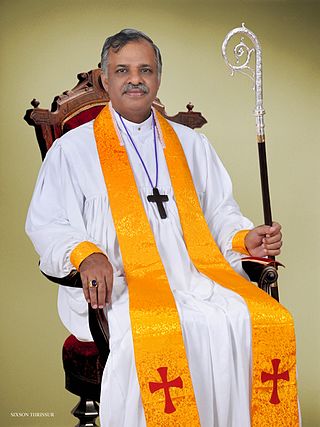
Baker Ninan Fenn is the Bishop of the Diocese of Cochin of the Church of South India.

Bishop Moore Vidyapith, Cherthala is a CBSE school run by the Church of South India (CSI) Diocese of Madhya Kerala, established in 2001. The school has a student strength of over 2000 pupils and about 100 staff.
CSIDiocese of Cochin is one of the twenty four dioceses of the Church of South India covering the churches in Ernakulam and Thrissur districts.

Saint Thomas Anglicans are the Saint Thomas Christian members of the Church of South India (CSI); the self-governing South Indian province of the Anglican Communion. They are among the several different ecclesiastical communities that splintered out of the once undivided Saint Thomas Christians; an ancient Christian community whose origins goes back to the first century missionary activities of Saint Thomas the Apostle, in the present-day South Indian state of Kerala. The Apostle, as legend has it, arrived in Malankara in AD 52.











